Fleurs du Mal Magazine


Or see the index

Verwunschene
In den Armen der Mühle hängen
die bleichen Verwunschenen
Drehen langsam den Stein des Brotes,
Unendlich geduldig.
Rings im Lande jagen die Prasser,
Aber die bleichen Verwunschenen
Mahlen unendlich geduldig das Korn.
Fängt ein Sturm ihre langen Ärmel
Sinken sie stumm in die heilige Erde.
Schicken von neuem bleiche Gesellen
Den Armen der Mühle
Geduldig, unendlich,
Verwunschen.
Bess Brenck-Kalischer
(Betty Levy, 1878-1933)
Verwunschene
• fleursdumal.nl magazine
More in: # Classic Poetry Archive, Archive A-B, Archive A-B

Maoriland
Maoriland, my mother!
Holds the earth so fair another?
O, my land of the moa and Maori,
Garlanded grand with your forests of kauri,
Lone you stand, only beauty your dowry,
Maoriland, my mother!
Older poets sing their frozen
England in her mists enshrouded;
Newer lands my Muse has chosen,
‘Neath a Southern sky unclouded;
Set, a solitary gem,
In Pacific’s diadem.
Land of rugged white-clad ranges,
Standing proud, impassive, lonely;
Ice and snow, where never change is,
Save the mighty motion only
Where through valleys seared and deep
Slow the serpent glaciers creep.
Land of silent lakes that nestle
Deep as night, girt round with forest;
Water never cut by vessel,
In whose mirror evermore rest
Green-wrapt mountain-side and peak,
Reddened by the sunset’s streak.
Land of forests richly sweeping,
By the rata’s red fire spangled;
Where at noonday night is sleeping,
Where, beneath the creepers tangled,
Come the tui’s liquid calls
And the plash of waterfalls.
Land where fire from Earth’s deep centre
Fights for breath in anguish furied,
Till she from the weight that pent her
Flings her flames out fiercely lurid;
Where the geysers hiss and seethe,
And the rocks groan far beneath.
Land of tussocked plain extending
In the distant blue to mingle,
Where wide rivers sigh unending
Over weary wastes of shingle;
Cold as moonlight is their flow
From the glacier-ice and snow.
Land where torrents pause to dally
‘Neath the toi’s floating feather,
Where the flax-blades in the valley
Whisper stealthily together,
And within the cabbage-trees
Hides the dying evening breeze.
Land where all winds whisper one word,
“Death!” — though skies are fair above her.
Newer nations white press onward:
Her brown warriors’ fight is over —
One by one they yield their place,
Peace-slain chieftains of her race.
Land where faces find no furrow,
With the flush of life elated;
Where no grief is, save the sorrow
Of a pleasure that is sated;
Land of children lithe and slim,
Fresh of face and long of limb.
Land of fair enwreathëd cities,
Wide towns that the green bush merge in;
Land whose history unwrit is —
Memory hath no chaster virgin!
Land that is a starting place
For a newer, nobler race.
Maoriland, my mother!
Holds the Earth so fair another?
O, my land of the moa and Maori,
Garlanded grand with your rata and kauri,
Lone you stand, only beauty your dowry,
Maoriland, my mother!
Arthur Adams
(1872-1936)
Maoriland
• fleursdumal.nl magazine
More in: Adams, Arthur, Archive A-B, Archive A-B
Mary Shelley verblijft op haar veertiende bij een familie in Schotland, waar een innige vriendschap ontstaat met Isabella Baxter.
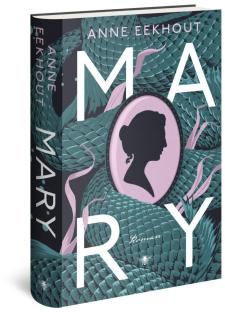 Samen dwalen ze in het gebied dat al eeuwen verhalen herbergt over monsters en geesten, en op een dag stuiten ze diep in het bos op een man die geen man is. De ledematen log en lelijk, een hoofd dat noch menselijk, noch dierlijk is.
Samen dwalen ze in het gebied dat al eeuwen verhalen herbergt over monsters en geesten, en op een dag stuiten ze diep in het bos op een man die geen man is. De ledematen log en lelijk, een hoofd dat noch menselijk, noch dierlijk is.
Vier jaar later brengt Mary met haar geliefde Percy Shelley een bezoek aan haar vrienden John Polidori en Lord Byron, bij het Meer van Genève. ’s Avonds bij het haardvuur vertellen ze elkaar verhalen. Een flintertje herinnering brengt haar terug naar haar tijd met Isabella in Schotland, en ook naar David Booth, een zeer intelligente, charismatische, maar tegelijk ook griezelige man, die een grote interesse in Mary en Isabella ontwikkelde. Dan dient ook het monster uit het bos zich weer aan, en vanuit die gedachte ontstaat haar verhaal over het monster van Frankenstein.
Mary is een ode aan de verbeelding, een verhaal over creëren, over de onlosmakelijke band tussen fantasie en werkelijkheid. En evenals Mary Shelley toont Anne Eekhout de kracht van een vrouw wanneer die iets ter wereld brengt wat niemand voor mogelijk had gehouden.
Anne Eekhout debuteerde in 2014 met de roman Dogma, die werd genomineerd voor de Bronzen Uil voor het beste debuut, op de longlist stond van de AKO Literatuurprijs en die wordt vertaald in het Duits. In 2016 verscheen Op een nacht (genomineerd voor de BNG Literatuurprijs) en in 2019 Nicolas en de verdwijning van de wereld, dat de prijs voor het Beste Boek voor Jongeren won. In november 2021 verschijnt de roman Mary waarin met verbluffende verbeeldingskracht de achttienjarige schepper van het meesterwerk Frankenstein tot leven wordt gewekt.
# new novel
Mary
Auteur: Anne Eekhout
Type: Gebonden
ISBN: 9789403153315
NUR: 301
Aantal pagina’s: 384
Uitgever: De Bezige Bij
Verschijningsdatum: 18-11-2021
Prijs: 24,99
• fleursdumal.nl magazine
More in: #Biography Archives, - Book News, - Bookstores, Archive E-F, Archive S-T, Byron, Byron, Lord, Keats, Keats, John, Mary Shelley, Percy Byssche Shelley, Shelley, Shelley, Mary, Shelley, Percy Byssche
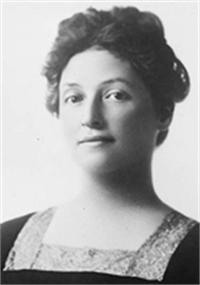
The Foundling
Beautiful Mother, I have toiled all day;
And I am wearied. And the day is done.
Now, while the wild brooks run
Soft by the furrows–fading, gold to gray,
Their laughters turned to musing–ah, let me
Hide here my face at thine unheeding knee,
Beautiful Mother; if I be thy son.
The birds fly low. Gulls, starlings, hoverers,
Along the meadows and the paling foam,
All wings of thine that roam
Fly down, fly down. One reedy murmur blurs
The silence of the earth; and from the warm
Face of the field the upward savors swarm
Into the darkness. And the herds are home.
All they are stalled and folded for their rest,
The creatures: cloud-fleece young that leap and veer;
Mad-mane and gentle ear;
And breath of loving-kindness. And that best,–
O shaggy house-mate, watching me from far,
With human-aching heart, as I a star–
Tempest of plum’d joys, just to be near!
So close, so like, so dear; and whom I love
More than thou lovest them, or lovest me.
So beautiful to see,
Ah, and to touch! When those far lights above
Scorch me with farness–lights that call and call
To the far heart, and answer not at all;
Save that they will not let the darkness be.
And what am I? That I alone of these
Make me most glad at noon? That I should mark
The after-glow go dark?
This hour to sing–but never have–heart’s-ease!
That when the sorrowing winds fly low, and croon
Outside our happy windows their old rune,
Beautiful Mother, I must wake, and hark?
Who am I? Why for me this iron Must?
Burden the moon-white ox would never bear;
Load that he cannot share,
He, thine imperial hostage of the dust.
Else should I look to see the god’s surprise
Flow from his great unscornful, lovely eyes–
The ox thou gavest to partake my care.
Yea, all they bear their yoke of sun-filled hours.
I, lord at noon, at nightfall no more free,
Take on more heavily
The yoke of hid, intolerable Powers.
–Then pushes here, in my forgetful hand,
This near one’s breathless plea to understand.
Starward I look; he, even so, at me!
And she who shines within my house, my sight
Of the heart’s eyes, my hearth-glow, and my rain,
My singing’s one refrain–
Are there for her no tidings from the height?
For her, my solace, likewise lost and far,
Islanded with me here, on this lone star
Washed by the ceaseless tides of dark and light.
What shall it profit, that I built for her
A little wayside shelter from the stark
Sky that we hear, and mark?
Lo, in her eyes all dreams that ever were!
And cheek-to-cheek with me she shares the quest,
Her heart, as mine for her, sole tented rest
From light to light of day; from dark–till Dark.
Yea, but for her, how should I greatly care
Whither and whence? But that the dark should blast
Our bright! To hold her fast,–
Yet feel this dread creep gray along the air.
To know I cannot hold her so my own,
But under surge of joy, the surges moan
That threaten us with parting at the last!
Beautiful Mother, I am not thy son.
I know from echoes far behind the sky.
I know; I know not why.
Even from thy golden, wide oblivion:
Thy careless leave to help thy harvesting,
Thy leave to work a little, live, and sing;
Thy leave to suffer–yea, to sing and die,
Beautiful Mother! …
Ah, Whose child am I?
Love sang to me. And I went down the stair,
And out into the darkness and the dew;
And bowed myself unto the little grass,
And the blind herbs, and the unshapen dust
Of earth without a face. So let me be.
For as I hear, the singing makes of me
My own desire, and momently I grow.
Yea, all the while with hands of melody,
The singing makes me, out of what I was,
Even as a potter shaping Eden clay.
Ever Love sings, and saith in words that sing,
‘Beloved, thus art thou; and even so
Lovely art thou, Beloved!’–Even so,
As the Sea weaves her path before the light,
I hear, I hear, and I am glorified.
Love sang to me, and I am glorified
Because of some commandment in the stars.
And I shall grow in favour and in shining,
Till at the last I am all-beautiful;
Beautiful, for the day Love sings no more.
Josephine Preston Peabody
(1874 – 1922)
The Foundling
• fleursdumal.nl magazine
More in: # Classic Poetry Archive, Archive O-P, Archive O-P
Vanwege de roem die hem al bij leven ten deel viel, weten we over Dante Alighieri (ca. 1265 – 1321) meer dan over de meeste van zijn tijdgenoten.
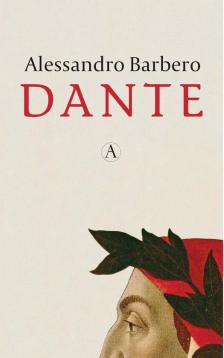 We volgen de later wereldberoemde dichter vanaf zijn adolescentie: als de zoon van een woekeraar, die ervan droomt tot de wereld van edelen en schrijvers te behoren. We zien hem in de donkere wandelgangen van de corrupte politiek en tijdens zijn ballingschap, waarin hij de verscheidenheid van veertiende-eeuws Italië ontdekt.
We volgen de later wereldberoemde dichter vanaf zijn adolescentie: als de zoon van een woekeraar, die ervan droomt tot de wereld van edelen en schrijvers te behoren. We zien hem in de donkere wandelgangen van de corrupte politiek en tijdens zijn ballingschap, waarin hij de verscheidenheid van veertiende-eeuws Italië ontdekt.
Historicus Alessandro Barbero plaatst de schepper van De goddelijke komedie in zijn tijd, cultuur en maatschappelijke context. Dante is daarmee niet alleen een portret van een dichter; het boek biedt een volledig beeld van een man die vat probeert te krijgen op macht, geld, oorlog, familie, vriendschap en liefde.
Alessandro Barbero is een van de vooraanstaandste historici van Italië. Zijn werk wordt internationaal gepubliceerd. Hij doceert Middeleeuwse Geschiedenis aan de universiteit van Piedmont Orientale in Vercilli. Tot zijn bekendste werken behoren Waterloo en Het mooie leven en de oorlogen van anderen, waarvoor hij de Premio Strega ontving.
#new books
Dante
Alessandro Barbero
Vertaler: Etta Maris
Paperback
Ingenaaid
Nederlands
Uitgever Athenaeum
Druk 1
Verschenen sep. 2021
Bladzijden: 384
Genre: Biografieen literaire auteurs
EAN 9789025313432
Afmetingen 216 x 136 x 31 mm
€ 27,50
• fleursdumal.nl magazine
More in: #Biography Archives, - Book News, Archive A-B, Archive C-D, Archive C-D, Dante Alighieri, MONTAIGNE, TOMBEAU DE LA JEUNESSE - early death: writers, poets & artists who died young

A Dream
I heard the dogs howl in the moonlight night;
I went to the window to see the sight;
All the Dead that ever I knew
Going one by one and two by two.
On they pass’d, and on they pass’d;
Townsfellows all, from first to last;
Born in the moonlight of the lane,
Quench’d in the heavy shadow again.
Schoolmates, marching as when they play’d
At soldiers once, but now more staid;
Those were the strangest sight to me
Who were drown’d, I knew, in the awful sea.
Straight and handsome folk, bent and weak, too;
Some that I loved, and gasp’d to speak to;
Some but a day in their churchyard bed;
Some that I had not known were dead.
A long, long crowd, where each seem’d lonely,
Yet of them all there was one, one only,
Raised a head or look’d my way;
She linger’d a moment, she might not stay.
How long since I saw that fair pale face!
Ah! Mother dear! might I only place
My head on thy breast, a moment to rest,
While thy hand on my tearful cheek were prest!
On, on, a moving bridge they made
Across the moon-stream, from shade to shade,
Young and old, women and men;
Many long-forgot, but remembered then,
And first there came a bitter laughter;
A sound of tears a moment after;
And then a music so lofty and gay,
That eve morning, day by day,
I strive to recall it if I may.
William Allingham
(1824 – 1889)
A Dream
• fleursdumal.nl magazine
More in: Allingham, William, Archive A-B, Archive A-B
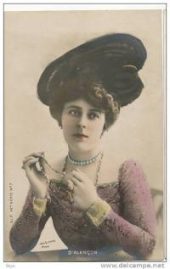
Requiescat in Pace
A Alec Carter
Mort au champ d’honneur (1914).
(Qu’il repose en paix !).
Où donc repose-t-il à présent, l’être cher ?
Dans le creux de quel arbre ou sous quelle colline ?
Quel oreiller soutient son beau visage clair ?
Sur quels draps argileux crispe-t-il ses mains fines ?
Autrefois, sur mon bras, il dormait tendre et fier ;
Je voyais son regard à travers ses paupières,
A-t-il pris, pour mourir, sa pose familière ?
Et ses yeux sans regards, peut-être, sont ouverts ?
Je n’ écarterai plus ses cheveux sur sa tête,
Je ne le verrai plus sourire en s’éveillant,
Je ne connaîtrai plus la délicate fête
De prendre, en un baiser, la gaîté de ses dents.
Que n’ai-je pu du moins, charmer sa dernière heure !
Eclairer la douleur et l’ombre du chemin ;
Pour qu’il sente qu’une âme est près de lui, qui pleure,
Que je borde son lit de mes tremblantes mains.
Mais non ! le lit est fait de feuilles et de terre,
C’est un lit à la fois, étroit, vaste et glacé…
Sans couronnes de fleurs, sans cierges mortuaires,
Je ne sais où – là-bas – est mort le bien-aimé !
Emilienne d’Alençon
(1869-1946)
Requiescat in pace
A Alec Carter Mort au champ d’honneur (1914).
(Qu’il repose en paix !).
• fleursdumal.nl magazine
More in: Archive A-B, Archive A-B, d'Alençon, Émilienne
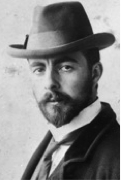
My Love
She has tender eyes that tell
All her prim, set lips suppress —
Daring thoughts that ever dwell
Prisoned in her bashfulness;
Hints of sudden tenderness
That within her breast rebel.
Till her bosom’s fall and swell
Tell her meaning all too well,
To her heart’s demure distress.
She has soft, smooth cheeks that flame
As she nestles close, so close,
With the new half-joy, half-shame,
That within her bosom glows,
And each fevered feature shows.
Her hot pulses beat acclaim
Of the hopes she dare not tame,
Fervid thoughts she cannot name —
Till I kiss her, and she knows.
She has clinging arms of white,
Little hands and fingers fine,
And she holds me tight, so tight;
While her eager arms entwine
Deep I drink her kisses’ wine.
Hush! I feel through all her slight,
Trembling figure love’s delight,
And she knows that all is right,
And her bosom beats with mine.
Arthur Adams
(1872-1936)
My Love
• fleursdumal.nl magazine
More in: Adams, Arthur, Archive A-B, Archive A-B
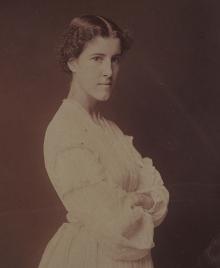
Girls of to-day
Girls of today! Give ear!
Never since time began
Has come to the race of man
A year, a day, an hour,
So full of promise and power
As the time that now is here!
Never in all the lands
Was there a power so great,
To move the wheels of state,
To lift up body and mind,
To waken the deaf and blind,
As the power that is in your hands!
Here at the gates of gold
You stand in the pride of youth,
Strong in courage and truth,
Stirred by a force kept back
Through centuries long and black,
Armed with a power threefold!
First: You are makers of men!
Then Be the things you preach!
Let your own greatness teach!
When Mothers like this you see
Men will be strong and free–
Then, and not till then!
Second: Since Adam fell,
Have you not heard it said
That men by women are led?
True is the saying–true!
See to it what you do!
See that you lead them well.
Third: You have work of your own!
Maid and mother and wife,
Look in the face of life!
There are duties you owe the race!
Outside your dwelling-place
There is work for you alone!
Maid and mother and wife,
See your own work be done!
Be worthy a noble son!
Help man in the upward way!
Truly, a girl today
Is the strongest thing in life!
Charlotte Perkins Gilman
(1860-1935)
Girls of to-day
Suffrage Songs and Verses
• fleursdumal.nl magazine
More in: # Classic Poetry Archive, Archive G-H, Archive G-H, Feminism
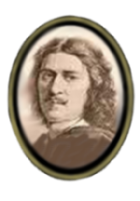
La pluie
Enfin la haute Providence
Qui gouverne à son gré le temps,
Travaillant à notre abondance
Rendra les laboureurs contents :
Sus ! que tout le monde s’enfuie,
Je vois de loin venir la pluie,
Le ciel est noir de bout en bout
Et ses influences bénignes
Vont tant verser d’eau sur les vignes
Que nous n’en boirons point du tout.
L’ardeur grillait toutes les herbes,
Et tel les voyait consumer
Qui n’eût pas cru tirer des gerbes
Assez de grain pour en semer.
Bref, la terre, en cette contrée,
D’une béante soif outrée,
N’avait souffert rien de pareil
Depuis qu’une audace trop vaine
Porta le beau fils de Climène
Sur le brillant char du soleil.
Mais les dieux mettant bas les armes
Que leur font prendre nos péchés,
Veulent témoigner par des larmes
Que les nôtres les ont touchés :
Déjà, l’humide Iris étale
Son beau demi-cercle d’opale
Dedans le vague champ de l’air
Et, pressant mainte épaisse nue,
Fait obscurcir à sa venue
Le temps qui se montrait si clair.
Ces pauvres sources épuisées
Qui ne coulaient plus qu’en langueur,
En tressaillent comme fusées
D’une incomparable vigueur ;
je pense, à les voir si hautaines,
Que les eaux de mille fontaines
Ont ramassé dedans ces lieux
Ce qui leur restait de puissance
Pour aller par reconnaissance
Au devant de celles des cieux.
Payen, sauvons-nous dans ta salle
Voilà le nuage crevé ;
O, comme à grands flots il dévale !
Déjà, tout en est abreuvé.
Mon Dieu ! Quel plaisir incroyable !
Que l’eau fait un bruit agréable
Tombant sur ces feuillages verts !
Et que je charmerais l’oreille
Si cette douceur non pareille
Se pouvait trouver en mes vers !
Çà, que l’on m’apporte une coupe :
Du vin frais, il en est saison ;
Puisque Cérès boit à la troupe,
Il faut bien lui faire raison !
Mais non pas avec ce breuvage
De qui le goût fade et sauvage
Ne saurait plaire qu’aux sablons
Ou à quelque jeune pucelle
Qui ne but que de l’eau comme elle
Afin d’avoir les cheveux blonds.
Regarde à l’abri de ces saules
Un pèlerin qui se tapit :
Le dégoût perce ses épaules
Mais il n’en a point de dépit.
Contemple un peu dans cette allée
Thibaut à la mine hâlée
Marcher froidement par compas ;
Le bonhomme sent telle joie
Qu’encore que cette eau le noie,
Si ne s’en ôtera-t-il pas.
Vois déjà dans cette campagne
Ces vignerons tout transportés
Sauter comme genets d’Espagne
Se démenant de tous côtés ;
Entends d’ici tes domestiques
Entrecouper leurs chants rustiques
D’un fréquent battement de mains ;
Tous les coeurs s’en épanouissent
Et les bêtes s’en réjouissent
Aussi bien comme les humains.
Marc-Antoine Girard de Saint-Amant
(1594 – 1661)
La pluie
• fleursdumal.nl magazine
More in: # Classic Poetry Archive, Archive G-H, Archive G-H, Archive S-T, Archive S-T
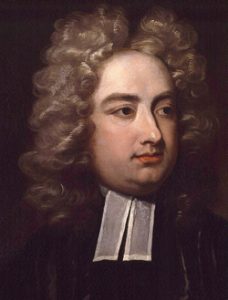
An Epigram
The scriptures affirm (as I heard in my youth,
For indeed I ne’er read them, to speak for once truth)
That death is the wages of sin, but the just
Shall die not, although they be laid in the dust.
They say so; so be it, I care not a straw,
Although I be dead both in gospel and law;
In verse I shall live, and be read in each climate;
What more can be said of prime sergeant or primate?
While Carter and Prendergast both may be rotten,
And damn’d to the bargain, and yet be forgotten.
Jonathan Swift
(1667 – 1745)
An Epigram
fleursdumal.nl magazine
More in: Archive S-T, Archive S-T, Swift, Jonathan
Franz Kafka (1883-1924) groeide op in Praag, waar hij deel uitmaakte van de Duitstalige Joodse gemeenschap en aan de rand van het getto woonde.
Hij bezocht het Duitse gymnasium en studeerde aan de universiteit van Praag. Daar ontmoette hij Max Brod, zijn vriend en latere biograaf.
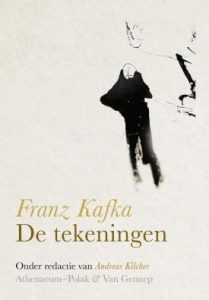 Vanaf 1908 tot 1917 werkte hij als ambtenaar bij een bedrijf dat arbeidsongevallenverzekeringen verzorgde, een baan die hij als een noodzakelijk kwaad beschouwde om zich aan het schrijven te kunnen wijden. Zijn longtuberculose, die hem in 1924 fataal zou worden, deed zich in deze tijd gelden. Gedurende zijn leven had hij enkele korte maar intense relaties, waaronder drie verlovingen, zo blijkt uit enkele postuum uitgegeven brieven. De dames waar hij mee omging komen ook indirect terug in zijn werk. Hij leidde een teruggetrokken leven, maar discussieerde veel binnen de Praagse culturele elite, mede via zijn ‘ontdekker’ Brod.
Vanaf 1908 tot 1917 werkte hij als ambtenaar bij een bedrijf dat arbeidsongevallenverzekeringen verzorgde, een baan die hij als een noodzakelijk kwaad beschouwde om zich aan het schrijven te kunnen wijden. Zijn longtuberculose, die hem in 1924 fataal zou worden, deed zich in deze tijd gelden. Gedurende zijn leven had hij enkele korte maar intense relaties, waaronder drie verlovingen, zo blijkt uit enkele postuum uitgegeven brieven. De dames waar hij mee omging komen ook indirect terug in zijn werk. Hij leidde een teruggetrokken leven, maar discussieerde veel binnen de Praagse culturele elite, mede via zijn ‘ontdekker’ Brod.
Een reconstructie van Kafka’s leven en denken is mogelijk geworden door zijn nalatenschap in de vorm van dagboeken, die hij van 1910 tot 1923 bijhield. Kafka schreef voornamelijk proza, waarvan zijn romans Der Prozess (1925), Das Schloss (1926) en Amerika (1927) de bekendste zijn. Enkele prozavertellingen als Die Verwandlung (1915), Das Urteil (1913) en In der Strafkolonie (1919) hebben later ook hun weg naar het grote publiek gevonden.
Wat Kafka’s werk typeert zijn tegenstellingen als weten en onwetendheid, macht en machteloosheid, loyaliteit en verraad, menselijkheid en verontmenselijking. Hij schetst labyrinten waarin individuen wanhopig naar een uitweg zoeken. De werelden die hij creëert zijn absurd, kennen een heel eigen logica en worden in een droge, zakelijke stijl beschreven. Veel van zijn werk is tijdens zijn leven onvoltooid gebleven, waardoor veel discussie mogelijk is over de bedoelingen van de schrijver. Pas in de jaren dertig van de twintigste eeuw groeide de belangstelling voor zijn werk, dat mede dankzij Max Brod postuum verscheen.
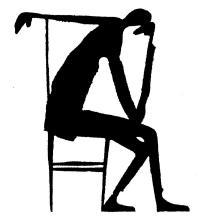 In 2019 werd het Max Brod Archief in de Nationale Bibliotheek van Israël geopend. Tussen de opvallende archiefstukken bevonden zich tot dusver onbekende tekeningen die Franz Kafka maakte in de jaren 1901-1906. Hij tekende, al voor de ontwikkeling van zijn literaire talent, om zich artistiek uit te drukken.
In 2019 werd het Max Brod Archief in de Nationale Bibliotheek van Israël geopend. Tussen de opvallende archiefstukken bevonden zich tot dusver onbekende tekeningen die Franz Kafka maakte in de jaren 1901-1906. Hij tekende, al voor de ontwikkeling van zijn literaire talent, om zich artistiek uit te drukken.
Aan zijn verloofde Felice Bauer schreef hij in 1913: ‘Weet je, ik was ooit een groot tekenaar, maar toen ben ik bij een slechte schilderes schoolse tekenlessen gaan nemen en heb ik mijn hele talent verknoeid. Stel je dat eens voor! […] In die tekeningen heb ik indertijd, het is nu al jaren geleden, meer bevrediging gevonden dan in enige andere bezigheid.’
In Franz Kafka. De tekeningen worden voor het eerst meer dan 200 tekeningen, waarvan 140 nooit eerder zijn gepubliceerd, in een luxe kunstuitgave samengebracht. Deze is samengesteld en van begeleidende essays en een verantwoording voorzien door Andreas Kilcher, Pavel Schmidt en Judith Butler.
Franz Kafka. De tekeningen
Auteur: Franz Kafka
Taal: Nederlands
Vertaald door Willem van Toorn
Uitgever Athenaeum
Hardcover
EAN 9789025313609
1 oktober 2021
336 pagina’s
Illustraties
49,90
# new books
Franz Kafka.
De tekeningen
• fleursdumal.nl magazine
More in: - Book News, - Bookstores, Archive K-L, Archive K-L, Art & Literature News, Franz Kafka, Illustrators, Illustration, Kafka, Franz, Kafka, Franz
Thank you for reading Fleurs du Mal - magazine for art & literature